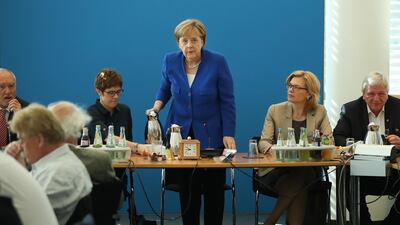Angela Merkel was locked in a power struggle with her own interior minister on Monday as he fought to impose his "master-plan" to reduce the number of migrants in the country.
Horst Seehofer, leader of the smaller coalition party Christian Social Union (CSU), has threatened to resign if Mrs Merkel, who has been chancellor since 2005, pursues a European based migration initiative agreed just last Friday.
Tense intra-party talks took place at the German parliament in Berlin throughout the day. Mr Seehofer told his local Munich paper, Süddeutsche Zeitung, that he would not back down under pressure.
"I will not be fired by the chancellor who is only chancellor because of me," he said.
At the national level, Mrs Merkel proposes that migrants arriving in Germany who first registered in another EU country should be placed in "admissions centres" under restrictive conditions.
Mr Seehofer views this offer as too weak, restricting Berlin's ability to send back refugees who claimed asylum in other European countries to those states.
Mr Seehofer wants to prevent asylum seekers from entering Germany if they have registered elsewhere in Europe. Mrs Merkel returned from an EU summit with what she says is an agreement with 16 other EU states to take back migrants registered there, about as much as could be expected without violating the bloc's free movement rules.
"The CSU has no recognisable strategy anymore, since the weekend," said Seehofer biographer Peter Mueller, author of "The power struggle: Seehofer and the Future of the CSU".
_______________
Read more:
Migrant deaths crossing Mediterranean surpass 1,000 in 2018
Germany's Merkel to discuss plans to reduce immigration
_______________
Mr Seehofer describes the confrontation as a matter of principle. EU rules clearly state that asylum seekers with pending applications do not enjoy the freedom of movement rights of citizens.
"With his threat of resignation and a renewed offer to negotiate, Seehofer has lost the last bit of credibility. The CSU acts like someone who is holding a gun to his own head and then threatens someone else with it. Horst Seehofer has put himself into a dead end, there is no way out."
The chancellor has warned "everyone knows the situation is serious" between her centre-right Christian Democratic Union and the CSU allies.
Mr Seehofer, who is CSU leader as well as federal interior minister, rejected her assessment that the EU-wide measures would "have the same effect" as his demand to turn away at the border asylum seekers already registered in other EU nations.
If he orders border police to go ahead with the scheme in defiance of the chancellor, Mrs Merkel would be forced to fire him, in turn prompting a CSU walkout that could cost her her majority in parliament.
The Bavarian party's discontent comes despite many of its long-standing migration demands appearing in the EU summit deal.
The new measures agreed on Friday were much more about reducing immigration into the EU than the so-called "secondary migration" of asylum seekers between countries
The leaders agreed to consider setting up "disembarkation platforms" outside the EU, most likely in North Africa, in a bid to discourage migrants and refugees boarding EU-bound smuggler boats.
Member countries could create processing centres to determine whether the new arrivals are returned home as economic migrants or admitted as refugees in willing states.
The document also outlined deals with 16 other countries to return already-registered migrants if they reached Germany.
The chancellor's crisis has been prompted by the CSU's fear of losing its absolute majority in Bavaria's state parliament, for which elections will be held in October.


